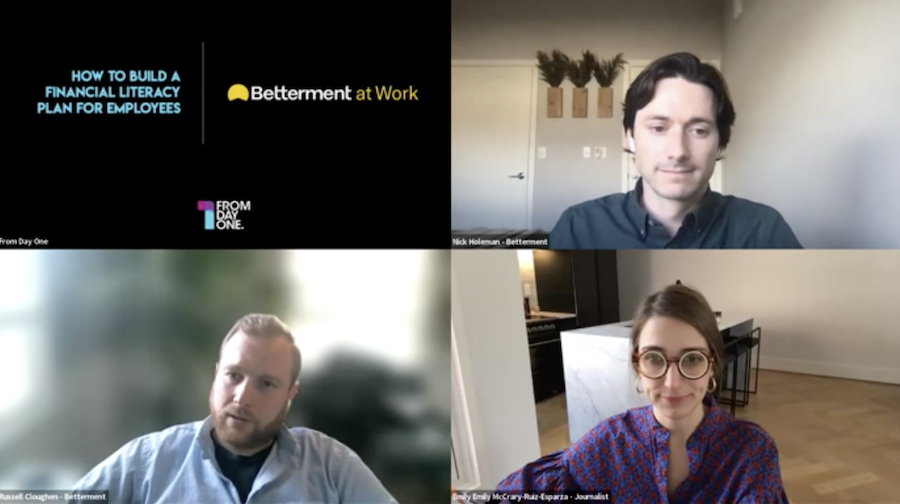A Financial Literacy Plan That Works for Your Employees


In a job market where workers are ready to change jobs for a chance at higher compensation, employers are looking for ways to make their total rewards stand out. Financial wellness tools are becoming a more common feature of benefits packages—if you can’t raise pay, then you can help your employees make the most of their salaries.
Why the new emphasis on financial wellness? Workers are preoccupied with money-related stress. More than three-quarters of Americans are anxious about their financial situation, according to a recent survey by Capital One and The Decision Lab, and 52% say they struggle to control their financial worries.
“As these pressures start to mount on your employees, they’re going to be looking to you to help them get more guidance on how to build wealth and how to lose this debt,” said Russ Cloughen, an account executive at financial advising company Betterment, during a recent From Day One webinar titled “How to Build a Financial Literacy Plan for Employees.”
Everyone is feeling the financial squeeze at the moment. “You’re all being asked to do more with less to retain talent, support diverse teams, and keep productivity high,” said Cloughen about employers’ current predicament. “Employees are essentially doing the same thing.”
Companies are in a prime position to help lighten the load, and it’s expected of them. According to Betterment’s own data, Cloughen pointed out, 65% of workers said they expect their employer to offer more financial support than before the pandemic.

Templatized financial advice isn’t helpful. Some workers need to prioritize retirement savings and some need to focus on paying down student debt, others need to downsize while planning to send kids to college. Economic concerns change too, and financial wellness tools need to keep up. For instance, workers have shifted their financial priorities since 2020, now working toward saving for retirement and paying down student loan debt more than they did before the pandemic, according to Betterment’s survey.
Cloughen and his colleague, Nick Holeman, who is Betterment’s director of financial planning, recommended employers provide financial tools that let employees seek the advice that helps them reach their personal goals. Still, many employers—and workers—think of financial advising as something for the wealthy, who have millions in the bank and even more bundled up in assets.
“Everyone needs financial advice,” said Holeman. “It can be as simple as maxing out your 401(k) match, understanding Roth versus traditional [IRAs], or building a three- to six-month emergency fund.” Even within traditional financial goals, there are infinite variations in execution, like how to prioritize what to save for and where to invest when money is tight.
Many of Holeman’s clients are just beginning to consider their finances strategically, “trying to figure out the first few steps that you need to take financially, whether it’s covering basic emergency expenses, maybe it’s just trying to contribute to your 401(k) for the first time.”
Employers can consider financial wellness tools an opportunity for differentiation, said Cloughen. If you can’t offer a unique set of benefits to each individual employee, at least you can provide a package that can be personalized.
People have come to expect personalization. Seventy-one percent of consumers expect companies to provide customized experiences, and 76% are unhappy when they don’t, according to a 2021 McKinsey report. It’s not surprising, then, that employers are looking for flexible benefits options.
Employers have the chance to stand out among their peers, said Cloughen, noting that 83% of workers that Betterment surveyed view financial wellness benefits as a sign that their employer values them. “These are the things that are going to help you stand out.”
Editor's note: From Day One thanks our partner, Betterment, for sponsoring this webinar.
Emily McCrary-Ruiz-Esparza is a freelance reporter and From Day One contributing editor who writes about the future of work, HR, recruiting, DEI, and women's experiences in the workplace. Her work has appeared in The Washington Post, Fast Company, Quartz at Work, Digiday’s Worklife, and Food Technology, among others.
The From Day One Newsletter is a monthly roundup of articles, features, and editorials on innovative ways for companies to forge stronger relationships with their employees, customers, and communities.